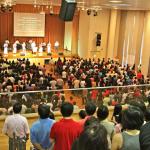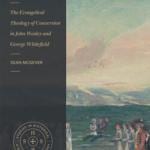This post is part of a series walking through the first volume of Abraham Kuyper’s Common Grace.
In the Genesis Flood, Good poured out both judgment and grace as it demonstrated salvation. The Flood, like baptism (or so Peter tells us, 1 Peter 3:20-21), is both death and life:
“The judgment that overtook our human race was terrible when, except for eight persons, the whole bundle of branches and twigs that had sprouted from our trunk was cut off as with one slash and only those few twigs remained. But in this judgment lay simultaneously the moral salvation of our race.
Had evil continued to develop in the same horrible way as before the flood, then the more decent part of humanity–the part that had already dwindled to only eight persons–would soon have been swallowed up entirely by the godless majority, and any higher, more noble future for mankind would have been cut off. After Noah’s death it was already Shem against Ham, with Japheth halfheartedly in between. What would it have been like if the flood had not come and Ham would have had the entire evil world behind him and Japheth would quickly have been led astray? Cutting off the godless majority in order to make a nobler development of our race possible was therefore an act of salvation.” (341-342)
In Kuyper’s view, the same is true of baptism. It has more than just a physical purpose–it has spiritual value that preserves God’s church. Kuyper thinks this connection is so important that 1 Peter 3:18-22 is the critical passage for a “correct understanding of common grace.” (342)
The Flood is really the first time we see grace–though it was there (albeit hidden) after the Fall. Common grace before the Flood was primarily seen behind delayed judgment. It is only post-Flood that we hear and see the encouragement of positive common grace.
The tool of the common grace is the covenant: the covenant and common grace are inseparable. For that matter, the covenant and any kind of grace are inseparable:
“When God enters into a covenant with his creature, it is a gesture of favor, of condescending goodness, of grace. Grace for the sinner is in fact inconceivable without the making of a covenant, simply because any basic relationship, any fundamental relationship between God and man itself depends on the covenant of works, which is why all sin has the character of a breach of covenant. Hence no restoration of the relationship is possible if another covenant does not take the place of he covenant that was violated and breached.” (343)
But what is a covenant? It is an “act of friendship”–or at least the making of one is. (344) It involves resisting a danger. The danger was not just that of damnation, it was also a smearing of God’s honor. The covenant God makes with us both protects us from danger and preserves His honor by uniting us with Him.
“In the Noahic covenant, therefore, God gathers together our entire race and with our race also this whole earth, all of nature, in order to prepare out of the same thing that Satan had chosen as an instrument against God, an instrument now to be used for himself and to be turned against Satan. Therefore sin has not been eliminated [in the Noahic covenant], and the working of sin and death continue unremittingly. But the coming, restraining, deferring, and postponing grace that had been at work since paradise and that had preserved our race, now becomes manifest to all in the form of the making of a covenant.” (345)
In the post-Flood covenant, common grace is now proclaimed and represented against he effects of sin and death. All of this brings us to the essence of common grace:
“the working of sin and death wrestle against the light. God does not cancel the working of sin and death. Rather, his judgments continue, but in those judgments themselves his common grace manifests itself. If death and sin ceased to operate, then no restraining force could work against them. But precisely because of their unremitting continuation, common grace works against them just as unremittingly and salvifically.” (346)
So common grace is not found within particular grace–rather the reverse is the case (though particular grace does strengthen common grace). The Noahic covenant is made with the whole world, not just with the church. An in the post-Noah era, we are in a new period where common grace works robustly–though not without changes over time (though these changes are not as sweeping or fundamental as they were after the Flood).
The state of the world after the Flood is the subject of the next post.
Dr. Coyle Neal is co-host of the City of Man Podcast and an Associate Professor of Political Science at Southwest Baptist University in Bolivar, MO













